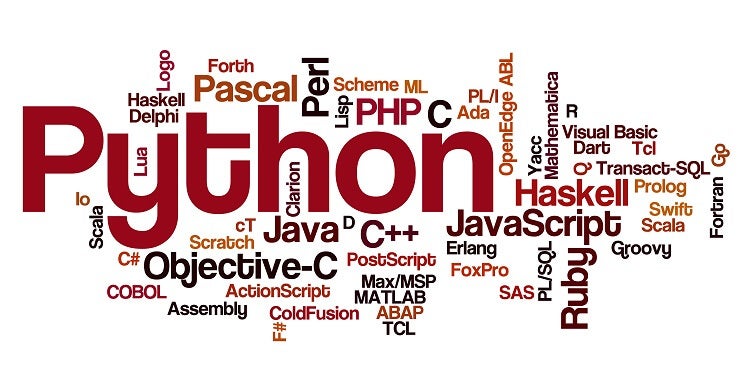The Most In-Demand Programming Language Every Computer Scientist Should Know

Inquiring computer scientists want to know: what is the most in-demand programming language? While there are several programming languages that are sure to have a role in the technology of the future, one rises to the top for several reasons. That language is Python, the high-level, general-purpose, programming language that aims to help programmers work quickly and integrate systems effectively - and which has continued to evolve over the last 30 years.
Python 3.x will have a prominent role in the near future of coding because it is commonly used in artificial intelligence, machine learning, and data science. Employers are looking for programmers with well-developed Python skills.
Are you wondering “what programming language should I learn next?” The answer is Python, and these are just some of the reasons why.
The Benefits of Python
While Python has been a programming language for over thirty years, with Python 3.10 its latest version to date, it has specific relevance to the computer scientists of the present and future. As the world continues to work, shop, play, and communicate more and more digitally each year, the language of Python will continue to build many of the web and desktop applications, servers, and frameworks where these events take place.
For example, eight of the most well-known and forward-thinking applications that are thriving in the present while keeping their eyes on the future were built with Python. Take a look at three of these eight Python-based applications and what their developers have to say about the building process.
-
Dropbox: Software engineers of the widely used file hosting service highlight Python’s readability, strong support, ease of memorization, and rapid development cycle.
-
Spotify: The largest music streaming service in the world, Spotify cites Python’s advanced data analytics and development speed it allows
-
Pinterest: Developers at Pinterest, an image-based social media platform, chose Python due to its capacity for speed, large amounts of content, and growing user numbers.
In addition to Dropbox, Spotify, and Pinterest, major enterprises like Uber, Facebook, and Instagram use Python as well — sometimes as their singular programming language and at other times in concert with other languages.

How Python Relates to Other Programming Languages
While Python is considered “ the future of programming languages,” there are several other programming languages that computer scientists should be aware of as well. Programming languages like Java, JavaScript, and C++ are commonly used. Sometimes, these languages are used alongside Python, like in the case of building the Uber app, which was written in Python, Node.js, Go, and Java.
While other programming languages have played and will continue to play an important role for computer scientists and technology at large, Python has risen to the top as the most important programming language for computer scientists to learn. In fact, Geeks for Geeks states that 80% of developers use Python as their main coding language, a percentage that is likely to only grow as emerging technologies continue to build using this versatile programming language.
Python Plays a Primary Role in Emerging Technologies
Python offers a wide range of libraries and frameworks that are useful in working with machine learning, artificial intelligence, and data science. Experts in these industries also cite flexibility, a wide community and support, and an extensive collection of packages as reasons why Python is far and away the best programming language for fields like machine learning.
Here are just some of the ways that the Python programming language is used in data science, as well as artificial intelligence and machine learning — industries whose jobs are expected to increase by 71% over the next five years.
-
ForecastWatch.com, which rates the accuracy of weather reports, uses Python entirely — from the back-end to the front-end — for acquiring, inputting, aggregating, and applying climatological data.
-
Union Investment, one of the largest asset managers in Germany, used Python to develop MALINA — MAchine Learning for INvestment Applications — which identifies potential return drivers for individual stocks and the market as a whole, predicts key performance indicators like revenue, and deduces whether or not the company might benefit from investing based on a specific data set.
-
Amazon, the ubiquitous online marketplace, uses Python to build artificial intelligence and machine learning solutions that make product recommendations and offer deals based on customer purchasing habits.
Employers Are Looking for Professionals with Python Skills
Employers are especially eager to hire developers with Python skills who can help them leverage these growing fields and their immense potential. In fact, CodingNomads found that Python was the most in-demand programming language of 2022 in the United States based on job postings on LinkedIn Jobs.
So what does it mean that employers are looking for developers with Python skills? How much of the language do those developers need to know, and what can they continue to learn on the job? The Python developer skills that many employers are looking for include:
-
Optimization of data algorithms
-
Knowledge of Python web frameworks and event-driven programming
-
Grasp of file handling concepts, variables and data types, and generators and iterators
-
Understanding of web frameworks like Django and Flask
-
Understanding of front-end technologies such as JavaScript, HTML, and CSS
-
Familiarity with object relational mappers (ORM) programming techniques
According to Indeed, the average base salary for a Python Developer in the United States is $114,918. Professionals with expertise in Python and the requisite education and experience can expect to enter a growing job market according to the Bureau of Labor Statistics. Some of the positions in that market include information security analyst, software developer, and computer information & research scientist.
Information Security Analyst
Information security analysts work to ensure that computer networks and systems remain safe. They may investigate security breaches, maintain software, prepare reports, and develop security measures. These professionals may use Python to automate tasks such as penetration testing, which checks a network or computer system for potential vulnerabilities.
According to the BLS, information security analysts earned an average salary of $103,590 in May 2020, and 33% growth rate is projected for the role between 2020 and 2030.
Software Developer
Software developers build applications that users access on their computers, smartphones, or tablets, as well as the systems that run devices and manage networks. They may research user needs then build software that meets those needs, design applications and systems, and perform software maintenance and testing. Software developers use Python to build applications efficiently and keep them running smoothly.
The BLS reports that software developers earned an average salary of $110,140 in May 2020. The profession is expected to see a 22% growth rate between 2020 and 2030.
Computer Information & Research Scientist
Computer information and research scientists develop innovative possibilities for technology in many fields, including business and medicine. They look into computing problems and design possible solutions that factor in computing needs and system standards. These professionals may use Python to build software, analyze data in pursuit of solutions to problems, and build new software or improve existing software.
The BLS reports that software developers earned an average salary of $126,830 in May 2020. The profession is expected to see a 22% growth rate between 2020 and 2030.

Grow Your Programming Skills through the Master of Computer Science Online Program at Worcester PoIytechnic Institute
Are you ready to see what you can build with the most in-demand programming language? Do you want to pursue a career in the rapidly developing and innovative field of technology? If so, the Master of Computer Science online program at WPI may be exactly right for you.
Prepare to build, improve, and innovate technology as you study prominent industry topics such as:
-
The tools and theories involved in the design of software, databases, algorithms, and computing systems
-
How to create algorithms and encode them in software languages such as Python
-
Analyzing and designing non-numeric algorithms and writing programs that integrate them with various data structures such as lists, stacks, queues, trees, and graphs
The Master of Computer Science online features a foundational track then offers four specializations so that students can tailor their degree paths to their career plans:
-
Computer System
-
Cybersecurity
-
AI & Machine Learning
-
Big Data Analytics
Students also have the opportunity to build their own focus area by choosing from a variety of electives that help them develop the skills and experience they need to pursue their ideal computer science role. A comprehensive capstone computing project also relates to each student’s personal career goals, giving them the opportunity to create professional deliverables just like they will throughout their careers.
The 30-credit hour degree program takes place 100% online. Join the WPI academic network and become a part of an educational community that has been ranked:
-
Top 50 Most Innovative Schools (U.S. News & World Report)
-
Top 25 STEM Colleges (Forbes)
-
#20 Best Value College/Top Return on Investment (Payscale.com)
Are you eager to take the next step?
Develop the knowledge you need to design and deploy real-world marketplace solutions. Learn more about the Master of Computer Science Online program at WPI
